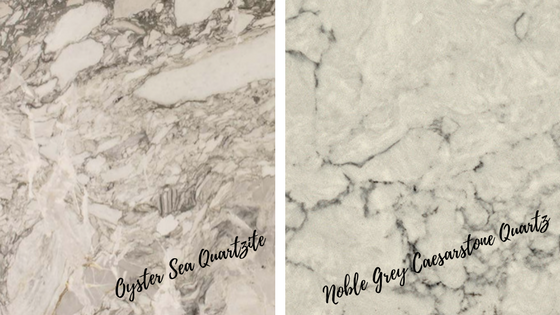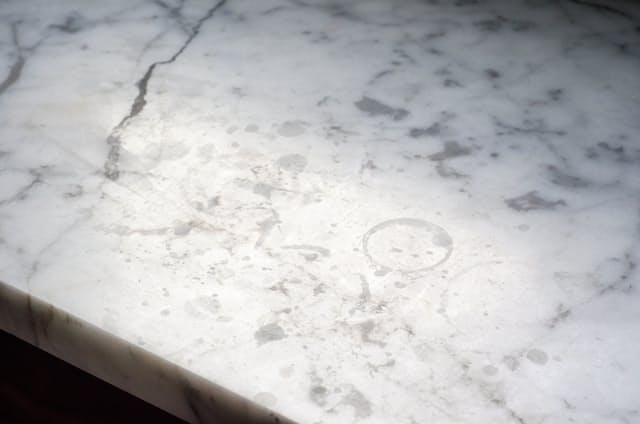Okay, so what’s what?
Many of our customers are surprised to learn that quartzite is actually a natural stone; whereas quartz is an engineered material created by combining color, resin and crushed stone.
Quartzite is a natural metamorphic rock that starts out as sandstone and, over time and under intense heat and pressure, evolves into a stone that is quarried, cut and fabricated. A lot of quartzite has swirling veins of white, gray, and tan coloring. It is often compared to granite in terms of hardness and durability.
Quartzite is gaining popularity with designers and homeowners because of its sophisticated look and crystalline sparkle. It’s naturally strong, very durable and takes on a look very similar to marble. Having said that, quartzite tends to be a good option for consumers who would like marble countertops but want something sturdier with less maintenance, less not none.
Quartz, on the other hand, requires no sealant and is essentially maintenance free because of is non-porous and dense characteristics. We will feature Quartz and its strengths and limitations on another day, stay tuned!
Care & maintenance
Now that we know which is which, let’s explore some finer details. Like granite, marble and other natural stones, quartzite is not indestructible. Proper care and professional sealing is essential to help protect the surface from stains and etching. Please remember that sealer doesn’t protect against etching, that’s where the care comes into play. The professionals at Tithof Tile & Marble complete every natural stone job with high-quality sealant that’s thoughtfully applied right in our fabrication shop. With that, spills should be wiped up as soon as possible and the use of hot pads and trivets are encouraged. On the contrary, because it’s non-porous and manufactured, quartz doesn’t have to be sealed, making it easier to maintain.
Identifying the difference between quartz and quartzite is only half the battle. If you’re set on a quartzite slab (and we don’t blame you), be sure to ask your fabricator if it’s hard or soft. Some types of quartzite are incredibly similar to marble (which is a metamorphosis of sandstone and crystals fusing which form crystalline rock), taking on those marble characteristics – such as softness, these are officially classified as a Dolomite, Geology 101 for the day.
Dolomites are typically referred to as soft quartzites, these are much more susceptible to staining and etching. Being educated before committing to some of those soft quartzites is very important to the longevity of your project and ultimately your happiness. A few soft quartzites in our current inventory: Super White, Brown Fantasy and some varieties of White Princess. But remember, be it hard (true) or soft quartzite, it’s still stone and thus porous in nature, like any stone it needs to be sealed properly.
We encourage our customers to become experts on their natural stone. Knowledge is definitely power when buying and caring for your countertop. Quartzite is an exceptional stone because it takes on the iconic look of marble with a bit less maintenance – the key word there is maintenance. Any slab of quartzite can still be damaged, especially because its density makes it quite brittle. If the stone is sealed properly and spills are cleaned up quickly, there shouldn’t be an issue, but Mother Nature rules that decision. All the man-made chemicals in the world sometimes can’t defend against human use and yes sometimes abuse.
Be mindful of acidic beverages that can do lasting damage to your countertop. What’s your drink of choice? If you’ve got a lot of juice, ice tea or soda in your kitchen then your countertop may be suffering. Acidic beverage spills on your countertop, even when left for a few minutes, could etch and stain your material. So, what’s an acidic beverage? Well, anything with a pH less than 7.00 is considered acidic. Next time you’re pouring yourself a drink on the counter, be aware of these numbers:
-Coke (most sodas) has a pH level of 3.65
-Orange juice has a pH level of 3.75
-Iced tea has a pH level of 2.86 (and if you sliced a lemon for your tea that has a pH level of 2.20).
Ultimately, we must understand that every piece of material is different and those differences are also found from slab to slab and within the same slab. Although there are categories of natural stones with identifiable characteristics, there’s no way of being 100% certain with every piece; especially when Mother Nature is involved, she is quite fickle. So, use your resources! Don’t hesitate to bombard your sales rep until you feel like an expert on the material. We gather as much information as possible from our suppliers to properly educate our customers on their specific offerings but it is often from field experience that we learn the most.
Now, who’s ready to be a natural stone expert?



